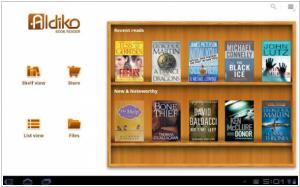Aldiko vs FBReader
Last updated: October 21, 2023
Aldiko and FBReader are both popular e-book reader applications, but they have distinct differences in terms of their features, supported formats, and user interfaces. One key difference lies in their supported formats. Aldiko is a versatile e-book reader that supports various formats, including EPUB, PDF, and DRM-protected content. It offers a wide range of customizable settings, such as font size, font type, and background color. Aldiko also provides features like bookmarking, highlighting, and night mode. On the other hand, FBReader primarily focuses on reading EPUB and MOBI formats. While it supports various other formats with the help of additional plugins, its primary strength lies in the compatibility with EPUB and MOBI files. FBReader offers a straightforward and minimalistic interface, making it suitable for users who prefer simplicity and ease of use.
Another notable difference between Aldiko and FBReader lies in their user interfaces and design choices. Aldiko provides a visually appealing and customizable interface. It offers multiple themes, allowing users to personalize their reading experience. Aldiko's interface provides intuitive controls and easy navigation through book collections. It also supports bookshelf view, making it visually similar to a physical bookshelf. FBReader, on the other hand, offers a clean and minimalistic interface with a focus on simplicity. It provides a straightforward reading experience without distracting elements. FBReader's interface emphasizes efficient reading and quick access to books, making it suitable for users who prefer a no-frills approach.
Additionally, Aldiko and FBReader differ in their additional features and integrations. Aldiko offers integration with popular e-bookstores like Feedbooks and Smashwords, allowing users to access a vast library of books directly from the app. It also provides synchronization capabilities, enabling users to access their e-books and reading progress across multiple devices. FBReader, on the other hand, offers integration with online book catalogs like Project Gutenberg and many other online libraries. It also supports network libraries, allowing users to access books from shared collections. FBReader's focus on integrating with various online libraries and catalogs expands its content availability and offers users a broader range of reading options.
Another notable difference between Aldiko and FBReader lies in their user interfaces and design choices. Aldiko provides a visually appealing and customizable interface. It offers multiple themes, allowing users to personalize their reading experience. Aldiko's interface provides intuitive controls and easy navigation through book collections. It also supports bookshelf view, making it visually similar to a physical bookshelf. FBReader, on the other hand, offers a clean and minimalistic interface with a focus on simplicity. It provides a straightforward reading experience without distracting elements. FBReader's interface emphasizes efficient reading and quick access to books, making it suitable for users who prefer a no-frills approach.
Additionally, Aldiko and FBReader differ in their additional features and integrations. Aldiko offers integration with popular e-bookstores like Feedbooks and Smashwords, allowing users to access a vast library of books directly from the app. It also provides synchronization capabilities, enabling users to access their e-books and reading progress across multiple devices. FBReader, on the other hand, offers integration with online book catalogs like Project Gutenberg and many other online libraries. It also supports network libraries, allowing users to access books from shared collections. FBReader's focus on integrating with various online libraries and catalogs expands its content availability and offers users a broader range of reading options.
34
One app to read them all. Bring all your ebooks, comics and audiobooks in the same place, no matter where they're coming from. Import your own EPUB, CBZ or PDF files. Buy all the latest releases and best sellers from Feedbooks, with a catalog that contains over a million references. Built-in support for public libraries, allowing you to easily browse your library's catalog and borrow books from them. Thousands of public domain books from Feedbooks
44
FBReader is an free eBook reader that supports numerous file formats like ePub, fb2, plucker, HTML, plain text, doc and more. You can also add multiple books at once in an archived format (tar, zip, gzip, bzip2). It supports embedded images, footnotes, hyperlinks, text search and full screen reading. It also has automatic bookmarking so that you don’t lose your place when closing a book.
Aldiko vs FBReader in our news:
2024. FBReader for Android improves ePub support
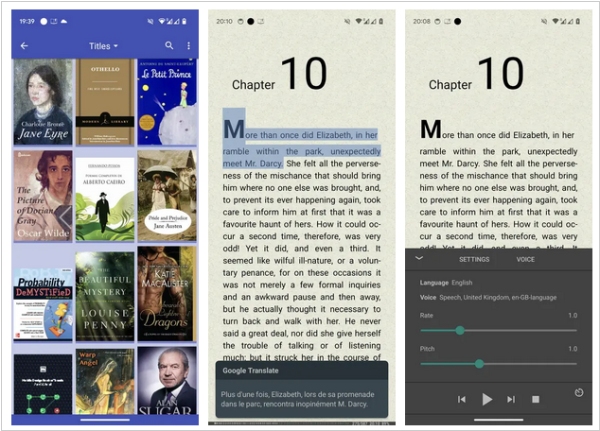
The new version of the popular reading app FBReader for Android 4.0 brings a significant change to the reader core. The developers have replaced the obsolete zip archive support with the modern libzip library. That means some ePub (and other zip files) that were not openable by FBReader will work now. On the other hand, any change in the core is potentially dangerous. Please report if you found some crashes or slowdowns with this release. Other new features include new appearance option: “Neglect screen notches”. It is helpful for devices with a wrongly detected notch, e.g., if the front camera is hidden under the screen. The app stores the correct reading per cent now. Reading progress will be shown correctly in the library. However, you have to open a book with the wrong indicator to fix it. The footer is visible over the reading-aloud panel. You can optionally switch to the old behaviour.
2022. FBReader starts a new cycle of Android updates
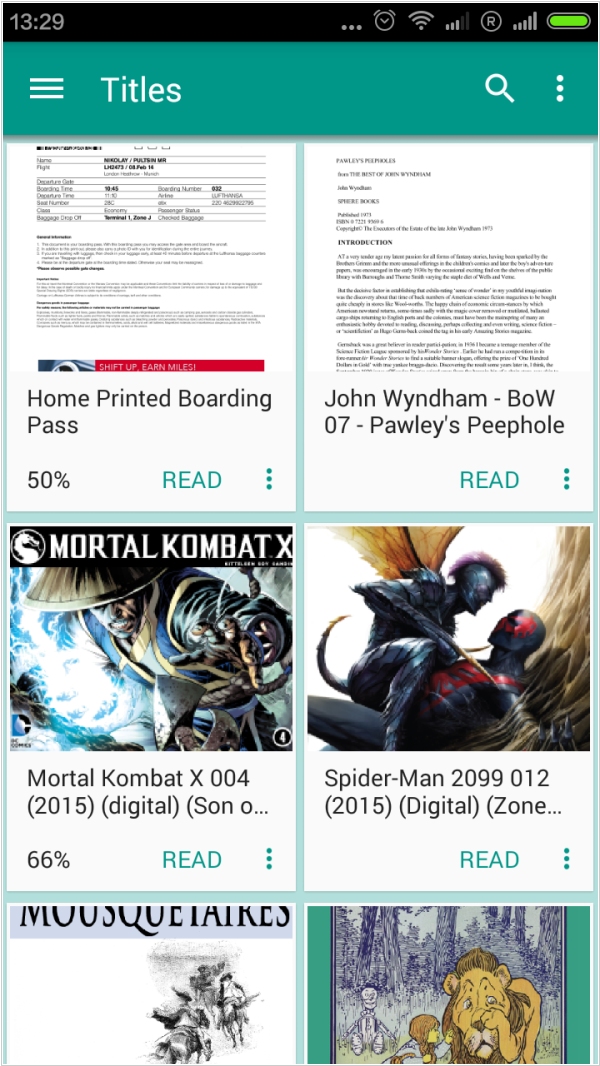
FBReader has recently launched its first Android update since April 2021, introducing version 3.1 and commencing a new cycle of Android enhancements. This release incorporates several notable features. FBReader now has permission to access the filesystem on devices running Android 11 and higher. Additionally, the Premium Edition has restored access to all TTS (Text-to-Speech) engines. The update also implements support for new bookmark styles introduced via the desktop version, although it is not possible to add or remove styles on a mobile device. Furthermore, buttons are now visible in all dialogues, and the broken Yandex Translator has been replaced with DeepL. Finally, the issue of incompatible cache has been resolved, eliminating the need to reopen the current book.
2022. FBReader for Mac is out
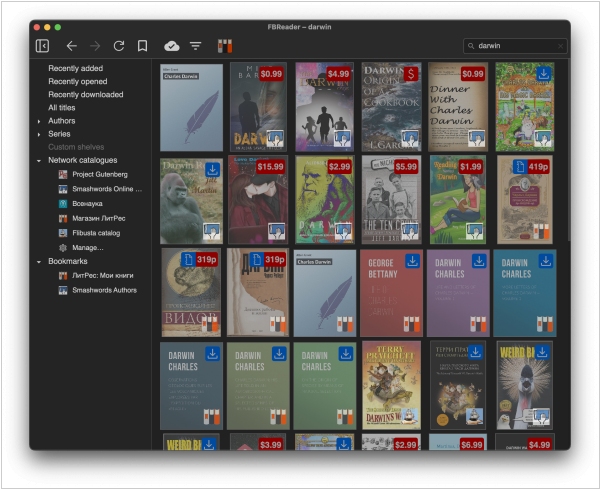
Popular ebook reader FBReader 2.0 for Mac can now be found on the Mac App Store, expanding its availability to three major desktop operating systems: Mac OS, Windows, and Linux. The reading mode and library view, including cloud sync, are mostly complete. FBReader supports a wide range of book formats, such as ePub, fb2, fb2.zip, mobi, rtf, MS doc, plain text, and cbz. The rendering engine is equipped with CSS styles, hyperlinks, hyphenation, page headers and footers, text selection, page turning, and text scrolling in two-column mode. Additional features include a table of contents, bookmarks, language selection, advanced text navigation, and a dark theme. Furthermore, FBReader offers a multi-book (multi-window) mode.
2022. FBReader comes back to Windows
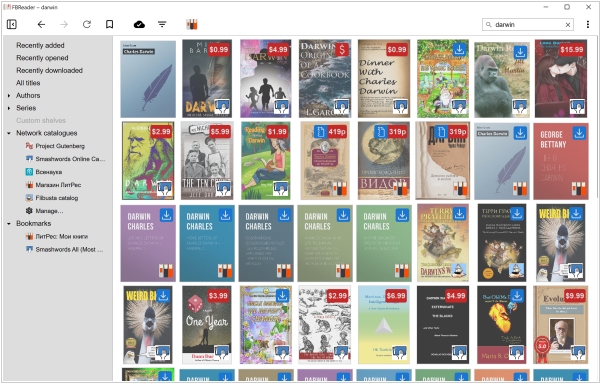
After an eight-year hiatus, FBReader makes its return to Windows. The latest release, FBReader 2.0, incorporates most of the features found in the iOS and Android versions, with a specific focus on desktops and laptops. The app is compatible with Windows 10 (build 17763 and higher) as well as Windows 11. Currently, FBReader is exclusively available for the Intel 64-bit architecture, but it can also function on Windows 11 Arm64 through emulation. Unfortunately, the app does not support Windows 10 Arm. FBReader 2.0 introduces a revamped interface, offering both light and dark themes. Additionally, it includes Ukrainian interface localization. The new render-engine utilizes CSS-defined colors, which can be disabled through the preferences settings. Users can find bookmark style options within the preferences dialogue. Furthermore, there is a new feature that allows the toolbar to be hidden in fullscreen mode. In the dark mode, the app automatically decreases the brightness of images. The developers have also added an "Import multiple files" menu item in the library window.
2019. De Marque acquires Feedbook, Aldiko
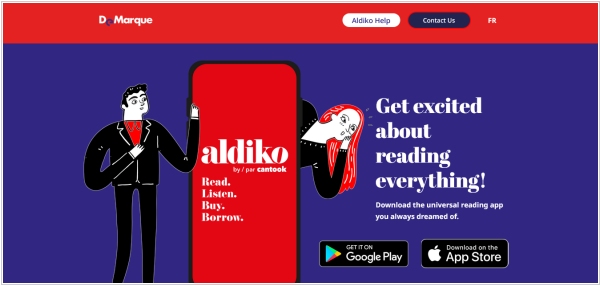
French Canadian ebook distributor De Marque has completed the acquisition of Paris-based Feedbooks for 230,000 euros, following the latter's bankruptcy in June. The sale of Feedbooks is part of a fire sale. Along with Feedbooks, De Marque has also acquired Aldiko, the Android app developer that Feedbooks purchased in 2014, which was once considered the top reading app for Android. All four employees of Feedbooks will be retained, although there is no mention of the Aldiko developers. It is hoped that this omission is merely an oversight, as the team represents about half of the company's value, and their departure would result in a loss of valuable knowledge.
2017. FBReader adds iOS app
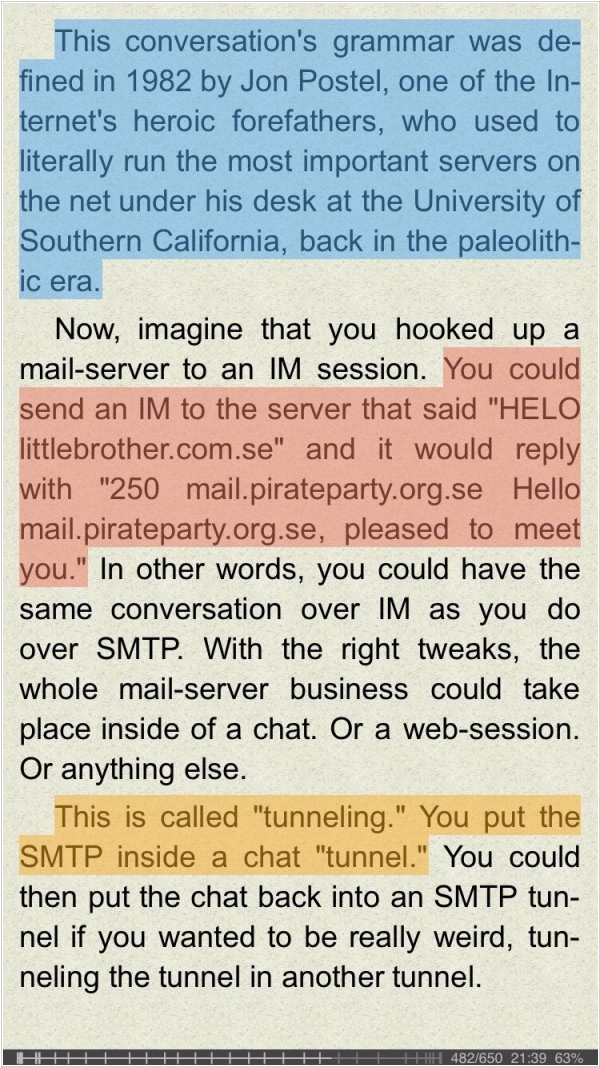
FBReader, a highly popular ebook reader available for Android and desktop, has recently launched its app for iPhone and iPad. The iOS version of the app utilizes the same engine as the FBReader app on other platforms and offers support for the same range of text formats. The primary supported formats include ePub, fb2 (including fb2.zip), and mobi (also known as Kindle azw3). Additionally, the reader is capable of opening HTML, RTF, MS Word documents (*.doc), and plain text files. However, it currently does not support "non-text formats" such as PDF, DjVu, and comics. The free version of FBReader for iOS does come with certain limitations, such as a maximum library size of ten books and disabled online translators. To access the full range of features, users have the option to upgrade to the paid version for a fee.

